
Bernard Stanley "Acker" Bilk, was an English clarinetist and vocalist known for his breathy, vibrato-rich, lower-register style, and distinctive appearance – of goatee, bowler hat and striped waistcoat.
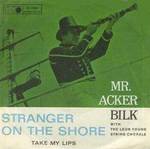
"Stranger on the Shore" is a piece for clarinet written by Acker Bilk for his young daughter and originally named "Jenny" after her. The tune was written on a single scrap of paper by Bilk and handed over to arranger Leon Young who crafted the string arrangement, including the characteristic harmonic shifts at the very end.

Maria Luisa McKee is an American singer-songwriter. She is best known for her work with Lone Justice, her 1990 song "Show Me Heaven", and her song "If Love Is a Red Dress " from the film Pulp Fiction.

Blind Willie Johnson was an American gospel blues singer and guitarist. His landmark recordings completed between 1927 and 1930—thirty songs in total—display a combination of powerful "chest voice" singing, slide guitar skills, and originality that has influenced generations of musicians. Even though Johnson's records sold well, as a street performer and preacher, he had little wealth in his lifetime. His life was poorly documented, but over time, music historians such as Samuel Charters have uncovered more about Johnson and his five recording sessions.
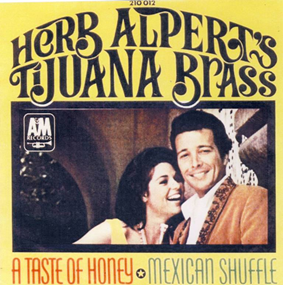
"A Taste of Honey" is a pop standard written by Bobby Scott and Ric Marlow. It was originally an instrumental track written for the 1960 Broadway version of the 1958 British play A Taste of Honey which was also made into the film of the same name in 1961. The original and a later recording by Herb Alpert in 1965 earned the song four Grammy Awards.
"Midnight Special" is a traditional folk song thought to have originated among prisoners in the American South. The song refers to the passenger train Midnight Special and its "ever-loving light."
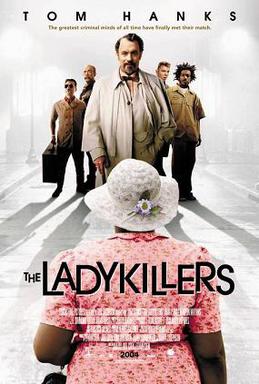
The Ladykillers is a 2004 American black comedy crime thriller film written, directed, produced and edited by Joel and Ethan Coen. The Coens' screenplay was based on the 1955 British Ealing comedy film of the same name, which was written by William Rose. The Coens produced the remake with Tom Jacobson, Barry Sonnenfeld, and Barry Josephson. It stars Tom Hanks, Irma P. Hall, Marlon Wayans, J. K. Simmons, Tzi Ma and Ryan Hurst, and marks the only time the Coens have worked with Tom Hanks so far and the first remake by the Coens. This was the first film in which Joel and Ethan Coen share both producing and directing credits; previously Joel had always been credited as director and Ethan as producer.

Alex Harvey and His Soul Band is the debut album by Alex Harvey accompanied by his Soul Band. It was originally released in 1964 on vinyl, and was re-released on vinyl in Germany in 1985 or 1986. The 1999 release is a compilation of 20 unreleased songs of the Soul Band, including two songs recorded before the debut album. The album is available on CD.
The Harmonizing Four was an American black gospel quartet organized in 1927 and reaching peak popularity during the decades immediately following World War II.

The Soul of a Man is an album of "twenty haunting spiritual blues songs" recorded in the late 1920s and 1930 by the American gospel blues singer and guitarist Blind Willie Johnson that was released by Charly Records in 2003.
"Keep Your Lamp(s) Trimmed and Burning" is a traditional gospel blues song. It alludes to the Parable of the Wise and Foolish Virgins, found in the Gospel of Matthew at 25:1-13, and also to a verse in the Gospel of Luke, at 12:35.

"Bye and Bye We're (or, I'm) Going to See the King" is a Christian song from the African-American musical tradition. It is known by a variety of titles, including "I Wouldn't Mind Dying (If Dying Was All)" and "A Mother's Last Word to Her Daughter". It was recorded seven times before 1930, using the preceding titles.
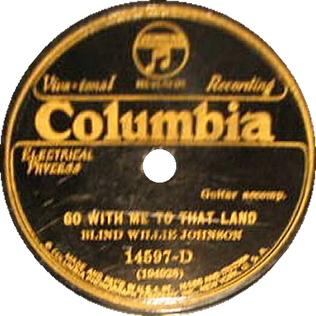
"Go with Me to That Land" or "Come and Go with Me (to That Land)" is a traditional gospel blues song recorded on April 20, 1930 by Blind Willie Johnson with backing vocals by Willis B. Harris, who may have been his first wife. It was released as a single on Columbia 14597-D, backed with "Everybody Ought to Treat a Stranger Right".

"God Don't Never Change" is a gospel blues song recorded by Blind Willie Johnson in 1929. The song is sometimes titled "God Don't Ever Change".

"God Moves on the Water" is a gospel blues song recorded by Blind Willie Johnson in 1929 and released on a 78 rpm record by Columbia Records.
Ernest Phipps was an American Old-time country musician and Southern gospel singer, best known for his recordings at the Bristol Sessions in 1928.
"Trouble Will Soon Be Over" is a traditional gospel blues song recorded in 1929 by Blind Willie Johnson and Willis B. Harris, who is thought to have been his first wife.

"Leave It There" is a Christian hymn composed in 1916 by African-American Methodist minister Charles A. Tindley. It has become popular enough to have been included in 12 hymnals; and even to be attributed to "traditional" or "anonymous". The title is sometimes given as "Take Your Burden to the Lord and Leave It There" or as "Take Your Burden to the Lord" or as "Take Your Burden", words taken from the song's refrain; the plurals "burdens" and "them" are sometimes used, and "God" instead of "the Lord":
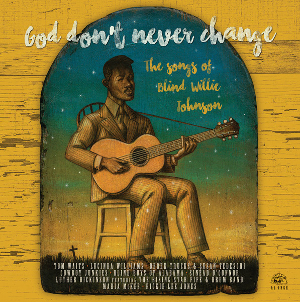
God Don't Never Change: The Songs of Blind Willie Johnson earned Grammy Award nominations for Best Roots Gospel Album and Best American Roots Performance for Blind Boys of Alabama recording of Mother's Children Have a Hard Time. The compilation was produced by Jeffrey Gaskill of Burning Rose Productions. The package features extensive historical liner notes by author Michael Corcoran.

The Complete Blind Willie Johnson is a compilation album of all the known recordings by American gospel blues singer-guitarist Blind Willie Johnson. As part of the Roots N' Blues series, it was released jointly by Columbia Records and Legacy Recordings, on April 27, 1993. All of the tracks on the two-compact disc set were originally issued by Columbia on the then-standard two-sided 78 rpm record format.















